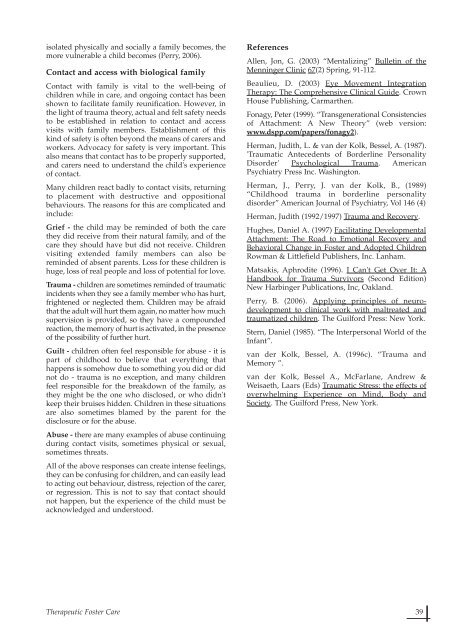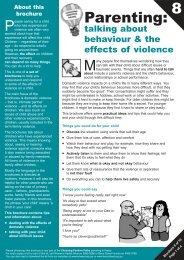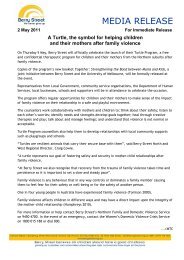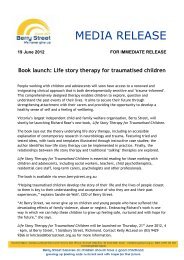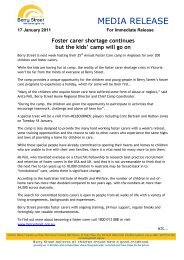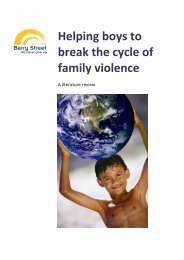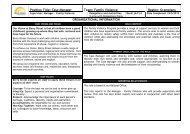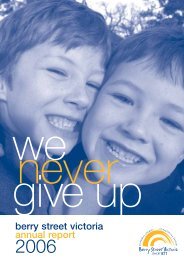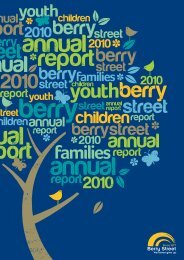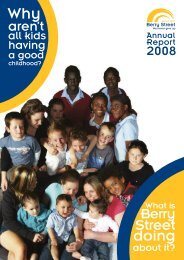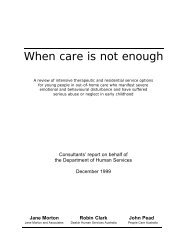Therapeutic foster care - Berry Street Childhood Institute
Therapeutic foster care - Berry Street Childhood Institute
Therapeutic foster care - Berry Street Childhood Institute
Create successful ePaper yourself
Turn your PDF publications into a flip-book with our unique Google optimized e-Paper software.
isolated physically and socially a family becomes, the<br />
more vulnerable a child becomes (Perry, 2006).<br />
Contact and access with biological family<br />
Contact with family is vital to the well-being of<br />
children while in <strong>care</strong>, and ongoing contact has been<br />
shown to facilitate family reunification. However, in<br />
the light of trauma theory, actual and felt safety needs<br />
to be established in relation to contact and access<br />
visits with family members. Establishment of this<br />
kind of safety is often beyond the means of <strong>care</strong>rs and<br />
workers. Advocacy for safety is very important. This<br />
also means that contact has to be properly supported,<br />
and <strong>care</strong>rs need to understand the child's experience<br />
of contact.<br />
Many children react badly to contact visits, returning<br />
to placement with destructive and oppositional<br />
behaviours. The reasons for this are complicated and<br />
include:<br />
Grief - the child may be reminded of both the <strong>care</strong><br />
they did receive from their natural family, and of the<br />
<strong>care</strong> they should have but did not receive. Children<br />
visiting extended family members can also be<br />
reminded of absent parents. Loss for these children is<br />
huge, loss of real people and loss of potential for love.<br />
Trauma - children are sometimes reminded of traumatic<br />
incidents when they see a family member who has hurt,<br />
frightened or neglected them. Children may be afraid<br />
that the adult will hurt them again, no matter how much<br />
supervision is provided, so they have a compounded<br />
reaction, the memory of hurt is activated, in the presence<br />
of the possibility of further hurt.<br />
Guilt - children often feel responsible for abuse - it is<br />
part of childhood to believe that everything that<br />
happens is somehow due to something you did or did<br />
not do - trauma is no exception, and many children<br />
feel responsible for the breakdown of the family, as<br />
they might be the one who disclosed, or who didn't<br />
keep their bruises hidden. Children in these situations<br />
are also sometimes blamed by the parent for the<br />
disclosure or for the abuse.<br />
Abuse - there are many examples of abuse continuing<br />
during contact visits, sometimes physical or sexual,<br />
sometimes threats.<br />
All of the above responses can create intense feelings,<br />
they can be confusing for children, and can easily lead<br />
to acting out behaviour, distress, rejection of the <strong>care</strong>r,<br />
or regression. This is not to say that contact should<br />
not happen, but the experience of the child must be<br />
acknowledged and understood.<br />
References<br />
Allen, Jon, G. (2003) “Mentalizing” Bulletin of the<br />
Menninger Clinic 67(2) Spring, 91-112.<br />
Beaulieu, D. (2003) Eye Movement Integration<br />
Therapy: The Comprehensive Clinical Guide. Crown<br />
House Publishing, Carmarthen.<br />
Fonagy, Peter (1999). “Transgenerational Consistencies<br />
of Attachment: A New Theory” (web version:<br />
www.dspp.com/papers/fonagy2).<br />
Herman, Judith, L. & van der Kolk, Bessel, A. (1987).<br />
'Traumatic Antecedents of Borderline Personality<br />
Disorder' Psychological Trauma. American<br />
Psychiatry Press Inc. Washington.<br />
Herman, J., Perry, J. van der Kolk, B., (1989)<br />
“<strong>Childhood</strong> trauma in borderline personality<br />
disorder” American Journal of Psychiatry, Vol 146 (4)<br />
Herman, Judith (1992/1997) Trauma and Recovery.<br />
Hughes, Daniel A. (1997) Facilitating Developmental<br />
Attachment: The Road to Emotional Recovery and<br />
Behavioral Change in Foster and Adopted Children<br />
Rowman & Littlefield Publishers, Inc. Lanham.<br />
Matsakis, Aphrodite (1996). I Can't Get Over It: A<br />
Handbook for Trauma Survivors (Second Edition)<br />
New Harbinger Publications, Inc, Oakland.<br />
Perry, B. (2006). Applying principles of neurodevelopment<br />
to clinical work with maltreated and<br />
traumatized children. The Guilford Press: New York.<br />
Stern, Daniel (1985). “The Interpersonal World of the<br />
Infant”.<br />
van der Kolk, Bessel, A. (1996c). “Trauma and<br />
Memory ”.<br />
van der Kolk, Bessel A., McFarlane, Andrew &<br />
Weisaeth, Laars (Eds) Traumatic Stress: the effects of<br />
overwhelming Experience on Mind, Body and<br />
Society. The Guilford Press, New York.<br />
<strong>Therapeutic</strong> Foster Care 39


